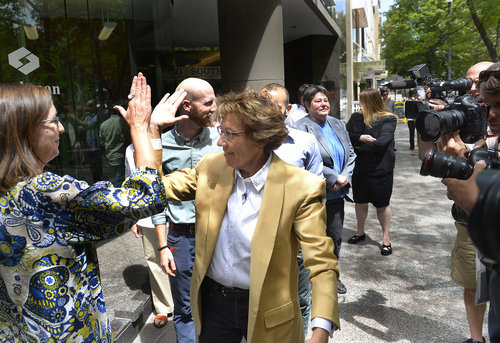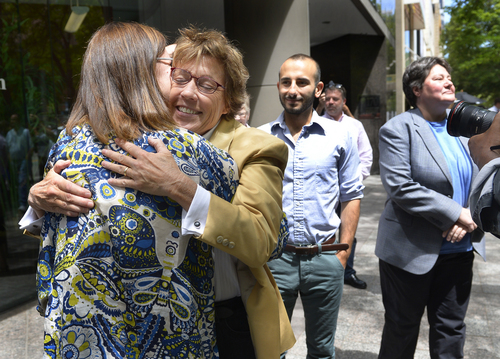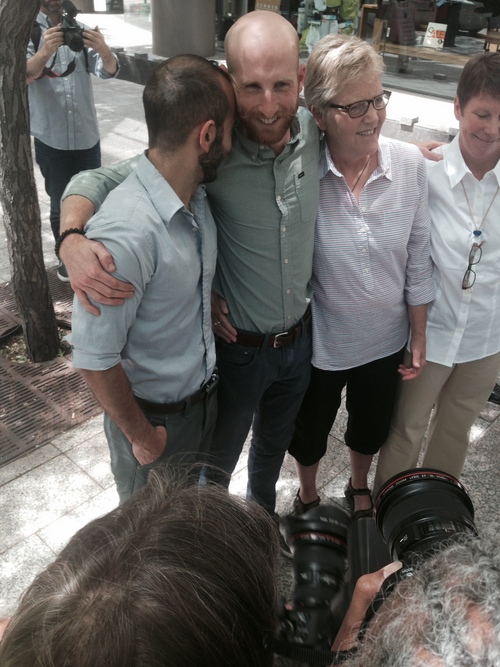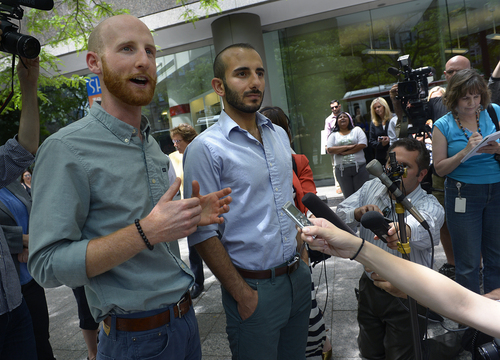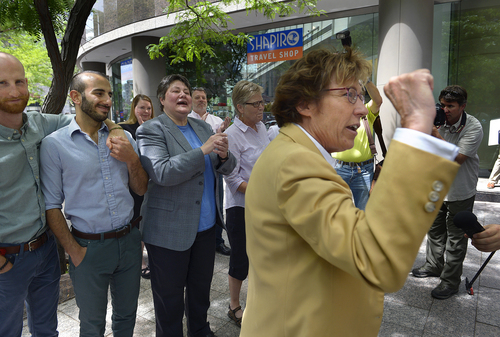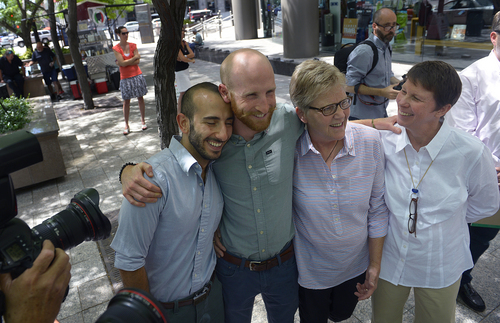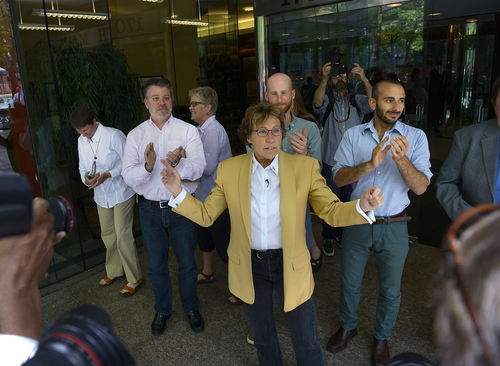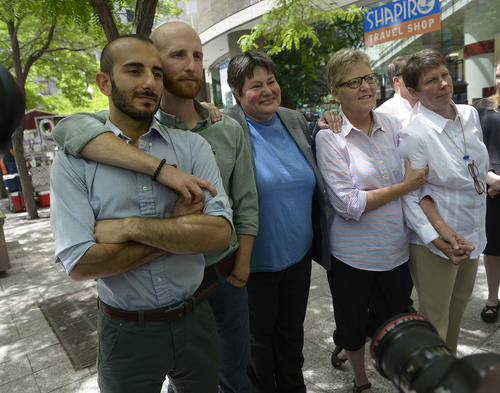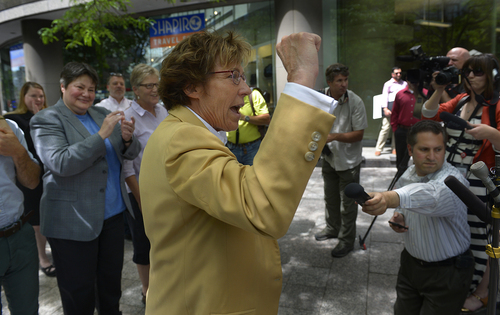This is an archived article that was published on sltrib.com in 2014, and information in the article may be outdated. It is provided only for personal research purposes and may not be reprinted.
A federal appeals court on Wednesday ruled that states outlawing same-sex marriage are in violation of the U.S. Constitution.
By upholding a Utah judge's decision, a three-member panel of the 10th Circuit Court of Appeals in Denver became the first appeals court in the nation to rule on the issue, setting a historic precedent that voter-approved bans on same-sex marriage violate the Fourteenth Amendment rights of same-sex couples to equal protection and due process.
But the court immediately stayed the implementation of its decision, pending an anticipated appeal to the U.S. Supreme Court.
Utah attorney general's office said Wednesday it will initiate that appeal.
Meanwhile, the state could ask the 10th Circuit Court to re-hear the matter before the full court.
University of Utah law professor Clifford Rosky called Wednesday's ruling, "the most important victory of the entire gay rights movement."
It is the first time a federal appeals court has recognized that same-sex couples have the same fundamental right to marry as all Americans, said Rosky, chairman of Equality Utah's board of directors.
"Very few courts have embraced the fundamental rights argument and this court seems to have completely embraced it and applied 'strict scrutiny,' the highest standard recognized under constitutional law," Rosky said.
If the state asks the 10th Circuit Court to re-hear the matter before the full court of 12 judges, Rosky said he doubts they will get a different result, and the request may not even be granted.
The court's two-to-one ruling affirms U.S. District Judge Robert Shelby's December decision, which struck down Utah's ban on same-sex marriage and prompted more than a 1,000 same-sex couples to marry during a 17-day window before the U.S. Supreme Court issued a stay, halting all such weddings.
Wednesday's decision "certainly lends legal clarity at this stage," said Salt Lake County District Attorney Sim Gill.
But it remains unclear what practical effect it will have, if any, Gill said.
The state of Utah now has 90 days to ask the high court to weigh in, Gill said. The only way that counties would be free to immediately start issuing marriage licenses to same-sex couples would be if the state chooses not to petition the high court, he said.
"The ball really goes back to the state of Utah," Gill said.
The Utah attorney general's office released this statement Wednesday: "Although the Court's 2-1 split decision does not favor the State, we are pleased that the ruling has been issued and takes us one step closer to reaching certainty and finality for all Utahns on such an important issue with a decision from the highest court.
"For that to happen, the Utah Attorney General's Office intends to file a Petition for Writ of Certiorari to the United States Supreme Court. The Tenth Circuit Court's issuance of a stay will avoid further uncertainty until the case is finally resolved. Whether the Utah Attorney General's Office seeks en banc [full court] review of the Tenth Circuit's ruling has yet to be determined."
Despite the continuing uncertainty, attorney Peggy Tomsic, who represented the three same-sex couples who are plaintiffs in the Kitchen v. Herbert lawsuit that is the subject of Wednesday's decision, called the ruling "an absolute victory for fairness and equality" for the people of Utah and other states in the 10th Circuit.
Plaintiff's Moudi Sbeity and Derek Kitchen, had posted this Facebook comment: "Today is a great day for all that came before us, for all in the current trenches fighting for equality, and for all who are affected.
"The 10th Circuit upheld Judge Shelby's ruling, affirming that the right to marry and love is a right guaranteed to all Americans," the couple said. "Thank you all for the outpouring of love and support, and especially a huge thank you to our team and co-plaintiffs. Love on, Utah!"
Many conservatives in Utah were disheartened by the ruling, but they have not given up in their fight to keep marriage between a man and a woman.
Gov. Gary Herbert issued a statement saying he was disappointed."
"I believe states have the right to determine their laws regarding marriage. I am grateful the Court issued a stay to allow time to analyze the decision and our options. But as I have always said, all Utahns deserve clarity and finality regarding same-sex marriage and that will only come from the Supreme Court."
Sen. Orrin Hatch made headlines recently by saying in May that it was almost a certainty that gay marriage will become legal. That said, he still expressed disappointment at the 10th Circuit's actions.
"Although I am not surprised by today's decision, I disagree with the court's reasoning and hope the Supreme Court ultimately adheres to the original understanding of the Constitution and allow each state to define marriage for itself," he said.
Rep. Rob Bishop, R-Utah, said, "Utahns have made clear their wishes on this subject and their wishes should not be superseded by a judge. Additionally, protecting the 1st Amendment and religious institutions' rights and ability to uphold and act in accordance with their beliefs and principles must be a priority."
The Sutherland Institute, a conservative think tank, promised to help gather a legal team to defend the state's gay marriage ban.
"Any appeal at the U.S. Supreme Court is the main event and may decide the future of marriage for decades," according to a statement from Sutherland. "Defenders of marriage must be prepared. It's disappointing to have a few federal judges decide that they can unilaterally override the decision of Utah voters to preserve marriage as society's way of preserving children's opportunity to be reared by a mother and father."
The ruling affects all states in the 10th Circuit Court of Appeals: Colorado, Kansas, New Mexico, Oklahoma, Utah and Wyoming.
The court's majority opinion focused on the 14th Amendment, which gives equal protection to American citizens. The court said its reading of the Constitution shows that the legal rights of married couples has nothing to do with the gender of those in the union.
"We hold that the Fourteenth Amendment protects the fundamental right to marry, establish a family, raise children, and enjoy the full protection of a state's marital laws. A state may not deny the issuance of a marriage license to two persons, or refuse to recognize their marriage, based solely upon the sex of the persons in the marriage union," the appellate court said.
"Courts do not sit in judgment of the hearts and minds of citizens."
The majority judges attacked the state's arguments, which centered largely around how same-sex marriage affects child-rearing and religious freedom.
The judges wrote that the state's arguments rested on a link between marriage and procreation — an argument that they said failed because opposite-sex couples who do not or cannot procreate are still allowed to marry.
"Utah citizens may choose a spouse of the opposite sex regardless of the pairing's procreative capacity," the opinion reads. "The elderly, those medically unable to conceive, and those who exercise their fundamental right not to have biological children are free to marry and have their out-of-state marriages recognized in Utah, apparently without breaking the 'conceptual link between marriage and procreation.'"
The judges pointed out that the only reference to reproduction in Utah's marriage law is a provision that allows first cousins to marry if they are over 65 years old or are over 55 and cannot reproduce.
The judges also emphasized that religious leaders are still free to practice their sacraments and traditions as they see fit, and are not required to allow same-sex marriage in their churches.
"We continue to recognize the right of the various religions to define marriage according to their moral, historical and ethical precepts," the opinion reads. "Our opinion does not intrude into that domain or the exercise of religious principles in this arena. The right of an officiant to perform or decline to perform a religious ceremony in unaffected by today's ruling."
Also Wednesday, a federal judge in Indianapolis struck down Indiana's ban on same-sex marriage Wednesday, according to the Associated Press. The ruling took effect immediately, allowing same-sex couples to marry.
The 10th Circuit Court on Wednesday split along that same lines that were formed during oral arguments in April, with pointed questions asked by the three judges — Paul J. Kelly Jr., Carlos F. Lucero and Jerome A. Holmes — about marriage studies, jurisdiction and standard of scrutiny.
At that time, Kelly — who was the dissenting judge in Wednesday's opinion — had asked the plaintiffs' attorney hard questions about state authority.
Kelly on Wednesday disagreed that the Fourteenth Amendment requires Utah to extend marriage to same-sex couple or recognize those marriages from other states.
He noted that the U.S. Supreme Court has recognized a fundamental right to marriage but said every decision vindicating that right has involved two opposite-gender people.
"Indeed, the Court has been less than solicitous of plural marriages or polygamy," Kelly wrote. "If the States are the laboratories of democracy, requiring every state to recognize same-gender unions — contrary to the views of its electorate and representatives — [it] turns the notion of a limited national government on its head."
Marriage does not exist in a vacuum and states have the right to regulate it, the judge said. He said Utah should prevail because the state has shown a rational basis for its decision — responsible procreation, effective parenting and the desire to proceed cautiously with a new social phenomenon.
"Utah's justifications for not extending marriage to include same-gender couples are not irrefutable. But they don't need to be; they need only be based upon 'any reasonably conceivable state of facts,' " Kelly wrote.
He also wrote, "We should resist the temptation to become philosopher-kings, imposing our views under the guise of constitutional interpretation of the Fourteenth Amendment."
During the April arguments in Denver, Tomsic had asked the judges to ensure marriage equality for all, while the state's lead attorney, Gene C. Schaerr, asked them to preserve marriage rights only for opposite-sex couples.
The state argued at that hearing that children benefit from being parented by a mother and a father, not two mothers or two fathers.
But Tomsic also argued that the case is about family. She said couples want to provide for and protect each other legally, and children are demeaned and humiliated when their parents are unable to marry and provide them with the benefits and protections associated with the civil institution.
Rosky called Wednesday's ruling "a bipartisan decision," noting that Kelly was nominated to the bench by former President George H.W. Bush, Lucero was nominated in by former President Bill Clinton and Holmes was nominated by former President George W. Bush.
Utah legislator Jim Dabakis, who is openly gay and was married during the brief time in December when same-sex marriage in Utah was legal, said of the ruling: "I am joyous, as I know hundreds of thousands of LGBT folks and their families are, all across the great state of Utah. This is a pro-family decision and it fits squarely with true Utah family values — love, kindness and a fair playing field for all. It's wonderful to see Utah, once again lead the country in gay rights."
Salt Lake City Mayor Ralph Becker said, "This is a great day for the laws of the United States, but it still has a long way to go," noting that the 10th Circuit expects the Supreme Court to have the final say.
The mayor, who helped marry gay couples in the hours after Judge Shelby's ruling last December, noted that Utah's key role in a legal process that may affect the entire nation.
The state "is playing a leading role in one of the major issues in our day for social justice" Becker said. "For me, it is exciting."
Evan Wolfson, president of Freedom to Marry, released a statement saying that ruling "has brought us one giant step closer to the day when all Americans will have the freedom to marry. This first federal appellate ruling affirms what more than 20 other courts all across the country have found: There is no good reason to perpetuate unfair marriage discrimination any longer. America is ready for the freedom to marry, and it is time for the Supreme Court to bring our country to national resolution and it should do so now."
The Church of Jesus Christ of Latter-day Saints released a statement saying: "The Church has been consistent in its support of marriage between a man and a woman and teaches that all people should be treated with respect. In anticipation that the case will be brought before the U.S. Supreme Court, it is our hope that the nation's highest court will uphold traditional marriage."
Meanwhile, a group called Mormons for Equality said many LDS Church members around the country were "celebrating today's ruling as a positive step toward protecting more families and children in our society.
"We appreciate in particular that the judges clearly addressed the distinction between the civil and religious marriage, and affirmed that 'religious institutions remain as free as they always have been to practice their sacraments and traditions as they see fit.'
"This ruling confirms that civil marriage equality is not a question about religious beliefs or practices, but rather of what public policies will treat all members of our society fairly and protect the diverse families which exist in our communities."
John Mejia, legal director of the American Civil Liberties Union of Utah, said in a news release, "This is a proud day for everybody in the state of Utah, and everybody across the country, who supports marriage equality. "
The ACLU had submitted a "friend of the court" brief in support of the plaintiffs in the Kitchen v. Herbert lawsuit. The ACLU also has filed a lawsuit in Utah federal court seeking recognition of the marriages of same-sex couples who were wed during the 17-day period when they were legal.
The Democratic candidate for Utah attorney general, Charles Stormont, said that as attorney general, he would immediately drop the appeal to the U.S. Supreme Court, because it is "an enormous waste of money and we should be fighting to protect people's rights, not to take them away. The state has no business dictating how people build their families, and the State should never tell children or their parents that they are second class citizens."
Regarding the decision in Indiana, Rea Carey, Executive Director of the National Gay and Lesbian Task Force, said, "We are delighted that same-sex couples in the Hoosier State will now have the option of marriage. Marriage equality has clearly reached a critical mass and we can look forward to all Americans having the freedom to marry."
The Tribune will continue updating this story as more information becomes available.
— Tribune reporters Thomas Burr, Matt Canham and Marissa Lang contributed to this story.
jmiller@sltrib.com
—
A time line of Utah's same-sex marriage saga
Nov. 2, 2004 • Utah passes Amendment 3, which states that "marriage consists only of the legal union between a man and a woman."
March 25, 2013 • Three couples file a lawsuit alleging Utah's Amendment 3 violates the 14th Amendment to the U.S. Constitution.
June 26, 2013 • The U.S. Supreme Court strikes down the Defense of Marriage Act, which barred gay marriage, and declines to rule on California's Proposition 8, clearing the way for same-sex marriage in the Golden State.
Dec. 20, 2013 • U.S. District Judge Shelby strikes down Utah's Amendment 3 as unconstitutional, opening the door to same-sex marriage in the state. More than 1,000 same-sex couples obtain marriage licenses during the next 17 days.
Jan. 6, 2014 • The U.S. Supreme Court grants the Utah Attorney General's Office request for a stay, ending same-sex marriage in Utah pending the 10th Circuit Court outcome of the state's appeal of Shelby's ruling.
March 12, 2014 • Utah decides to place same-sex marriages performed before the stay "on hold," rather than fully recognize or refuse to recognize them.
May 19, 2014 • U.S. District Judge Dale A. Kimball orders Utah to honor and recognize all same-sex marriages performed while Judge Shelby's ruling was in effect.
June 6, 2014 • The 10th Circuit Court of Appeals temporarily stayed Kimball's ruling, halting any movement toward marriage recognition. (The case remains on hold.)
June 25, 2014 • The 10th Circuit Court of Appeals rules that states outlawing same-sex marriage are in violation of the U.S. Constitution, but the court issues an immediate stay to its own ruling, anticipating an appeal by Utah to the U.S. Supreme Court.


